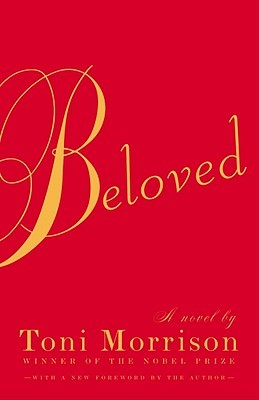Literary horror lovers, look no further. I’ve found it.
If The Shining is exemplary of commercial horror and House of Leaves of experimental horror, then Beloved is unquestionably the finest example of literary horror I’ve ever read.
I finished this novel by Toni Morrison over a week ago, and I’m still wrecked. Wrecked. Beloved is the most beautiful, chilling, heartbreaking, and ambitious novel I’ve ever read. One reviewer called it the great American novel, and I think I agree.
This is a difficult book to describe without giving things away. Instead of summarizing it for you, I’ll just link to the Goodreads summary of Beloved. Even that summary hints at but doesn’t tell what the book is really about, because Morrison’s reveal is slow and insidious and utterly unnerving. If you can get on board with this book without spoiling it for yourself, I say go for it.
I will give a disclaimer: this book is absolutely not for everybody. Many, many people just don’t like literary fiction. Many, many people don’t enjoy horror. This book is well and truly both, so I imagine the target audience (me, me, me!) is fairly small. If you want an easy read that gives you the answers, you’re going to absolutely hate this novel. If you like to feel comfortable and safe and inspired, you’re going to absolutely hate this novel. Beloved is difficult, daring, and thought-provoking. It’s gut-wrenching, dark, and frightening on many levels. If all of those adjectives piqued your interest, Beloved is probably for you.
Holy book gods, was it ever for me. How often do you find a book that challenges your mind, breaks your heart, shivers your spine, and tears out your guts?
It is worth mentioning that I happened to pick this one up as an audiobook instead of printed. I didn’t even realize until after I bought it that it was read by the author, but what a treat that turned out to be. Toni Morrison’s voice is spellbinding, and of course since she wrote the book, her reading was spot-on, using the perfect emphasis, tone, etc. throughout. I was really carried away by it. I felt immersed. Despite Beloved’s somewhat slow plot (lots of character backstory and time hopping), the pace never felt slow to me. I found myself making up excuses to listen longer. (Clean the house! Go to the gym! Do that errand that’s twenty minutes away…) I note the audio version not just because it was so good, but also because I read in reviews that the formatting/prose of the book was extra difficult for some readers. If you’re a reader who struggles with written dialect, stylistic punctuation, etc., then the audio might alleviate some of that.
The most amusing part of reading through reviews of this book were the claims that this novel isn’t horror. I know I talk about this a lot, but it’s because it directly impacts my life as an artist. Let me introduce you to a neat little bit of hypocrisy:
“Horror these days is all genre garbage. There’s nothing left but slasher trash and torture porn.”
“That’s not horror; it has a message. It’s way too deep and meaningful to be shoved into the ‘horror’ genre.”
If you can’t see the problem here, I don’t know what to tell you. I believe you might be bias-blind.
If ever you’ve thought either of those things, I would encourage you to give Beloved a try. You very well may not like it, but it’s hard for me to fathom how anyone could not at least appreciate it. And to my eyes, unless your definitions are so narrow as to be utterly useless, it’s inarguably literary–and inarguably horror.
So why the great American novel? Well, I can say without spoiling anything that this novel tackles head-on the largest skeleton in our country’s closet: slavery. And Morrison doesn’t do it in a trite way. Nor does she do it in a sweeping, epic way. She does it in an intimate, unshakable, impactful way.
Beloved uses the best of everything to its advantage. In the horror realm, Morrison is almost a literary Jack Ketchum–reminding us quite painfully that the deepest horrors are the real ones, the ones drawn from truth. She doesn’t hold back on the supernatural horror, either, but there are no parlor tricks here, no shock value. The supernatural element in Beloved is carefully chosen to support and expand the themes and messages of the book. We’re left terrified in a way that means something, shaken by the reality of our very history, our very world, and that’s what the best horror does. It scares us in a way that makes us think. It makes us examine and question why we feel repulsed, discomforted, or frightened, and what those reasons mean in a larger context.
In the literary realm, Morrison makes masterful use of her writer’s toolbox. The prose is unique and distinctly suited to its subjects. The difficulty of the book serves as a fitting form for the difficulty of the topics. The complexity here both mirrors and highlights the complexity of our world. The writing is exquisite. Beloved doesn’t put on any airs; the literary nature of it is simply the best vehicle for Morrison’s intent.
Have I gushed enough? This one goes on my favorites list for sure.
Taste is taste. As I said, if you don’t like lit-fic or don’t like horror, or even don’t like heavy fiction or difficult reading or any other number of what-have-yous, this might not be a book for you.
But to anyone who claims that literary horror doesn’t exist, I say read this book. And to anyone who reads this book and still claims it, I say you’re nuts, prejudiced, or both, because Beloved is a masterpiece of literary fiction, a masterpiece of horror fiction, and a masterpiece of a novel. An unflinching look at our country’s horrible history through the lens of the hauntingly personal? Great American novel indeed.
Still looking for something to read here at the end of Women in Horror Month? Look no further than Toni Morrison, one of my new literary heroes.
[Note: In case you missed it, Simon Dewar interviewed me for Women in Horror Month!]
Share this:

